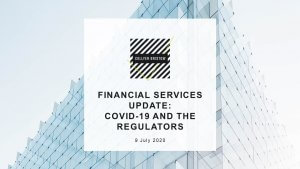- Banking & financial disputes
- Financial services

Longer Reads
Coronavirus and Loan Agreements: A Material Adverse Change?
Exploring the specific issue of MAC provisions in loan agreements, something that lenders and borrowers alike will need to consider more closely in light of COVID-19.
2 minute read
Published 16 March 2020
Key information
With the current extreme volatility in world markets and commentators predicting worsening economic and financial conditions worldwide, lenders exposed to industries particularly affected by the COVID-19 outbreak may consider invoking Material Adverse Change (MAC) provisions in loan agreements to demand early repayment from borrowers and/or to stop further lending.
The COVID-19 crisis is now deepening on a daily basis, with industry groups such as aviation, hospitality, manufacturing and retail raising the alarm about the existential threat posed by the virus and its catastrophic impact on revenue and cash flow in the coming weeks and months. At the same time, lenders will also be working over the next few weeks and months to assess their exposure and develop strategies to work with borrowers to manage the liquidity problems alongside credit risk.
If payments are not made under loan agreements this, of course, enables a lender to engage default provisions. Additionally, other covenants typically found in loan agreements may also be breached as a result of COVID-19. Most likely to be impacted are business covenants and financial covenants with an earnings component, such as EBITDA. A cessation of business is also likely to constitute an event of default, with (for example) grounded aircraft, ships remaining in port, developments halted by lack of workers all having the potential to force a temporary suspension of business.
But what some borrowers may not be so focussed on is the MAC provisions in loan agreements, which allow a lender to call in the loan and enforce any credit support provided (if the relevant circumstances in the MAC clause apply), even where there hasn’t been a non-payment or event of default.
The purpose of the MAC clause, broadly speaking, is to protect the lender against gaps in due diligence, unforeseen changes to the borrower’s financial situation, unexpected and drastic market fluctuations, and anything else that could be considered a “material” change to the borrower’s ability to repay the loan. While borrowers may view MAC clauses as a sign of the lender’s unwillingness to fully commit to the loan, lenders view MAC clauses as a necessary added protection against unforeseen and indeed, unforeseeable, material changes.
The Loan Market Association’s template documents for leveraged finance transactions contain very widely drafted (albeit optional) language which could quite foreseeably be engaged in relation to COVID-19: namely a material adverse change in the “business, operations, property, condition or prospects of the borrower” or “on the ability of the borrower to perform its obligations under the [finance documents]”. However, MAC clauses tend to be heavily negotiated in loan agreements and the precise wording will therefore need to be carefully analysed to establish whether a MAC could be called in any given case.
In 2013, the English High Court handed down a rare judgment on the interpretation of a MAC clause in Grupo Hotelero Urvasco SA v Carey Value Added SL (“Carey”). In that case, the court found that a MAC had not occurred but provided the following guidance on the approach to MAC provisions (i) A lender should always review the financial information available to it regarding the borrower before relying on such a clause (ii) the material change must affect the borrower’s ability to repay the loan (iii) it must not be temporary in nature and (iv) cannot include circumstances or events which were known to the lender at the time the agreement was made.
With COVID-19 now categorised as a global pandemic and the economic outlook worsening by the day, the impact felt by individual businesses may start to cross the line of the Carey guidance. Experts believe the proliferation of COVID-19 may last many months if not years, with consequences for particular businesses being of an enduring and/or terminal nature rather than temporary and/or recoverable. Also, where permitted by a relevant MAC clause, lenders may soon find it easier to prove that such deterioration in anticipated performance of a business will be a direct result of the COVID-19 outbreak and not the result of other pre-existing reasons or seasonal or cyclical fluctuations in the borrower’s business.
A lender’s approach will naturally depend upon the severity of the financial impact on the business. We expect lenders to engage positively with customers in an effort to help support the business, but this will be balanced by the need to preserve the lender’s risk profile. Agreements may be reached that waive breaches for a short period (while reserving a lender’s rights) during which time increased reporting is likely to be required of the borrower so that the lender remains fully in the picture as regards the progress of the business.
Indeed, lenders will need to tread carefully before invoking MAC clauses in reliance on COVID-19, the repercussions of which will likely be changing daily. Any lender found to have wrongfully called a MAC will face reputational damage and (perhaps more so than usual in this context) the risk of paying out substantial compensation for consequential loss to wrongly defaulted counterparties.
Related content
Longer Reads
Coronavirus and Loan Agreements: A Material Adverse Change?
Exploring the specific issue of MAC provisions in loan agreements, something that lenders and borrowers alike will need to consider more closely in light of COVID-19.
Published 16 March 2020
Associated sectors / services
Authors
With the current extreme volatility in world markets and commentators predicting worsening economic and financial conditions worldwide, lenders exposed to industries particularly affected by the COVID-19 outbreak may consider invoking Material Adverse Change (MAC) provisions in loan agreements to demand early repayment from borrowers and/or to stop further lending.
The COVID-19 crisis is now deepening on a daily basis, with industry groups such as aviation, hospitality, manufacturing and retail raising the alarm about the existential threat posed by the virus and its catastrophic impact on revenue and cash flow in the coming weeks and months. At the same time, lenders will also be working over the next few weeks and months to assess their exposure and develop strategies to work with borrowers to manage the liquidity problems alongside credit risk.
If payments are not made under loan agreements this, of course, enables a lender to engage default provisions. Additionally, other covenants typically found in loan agreements may also be breached as a result of COVID-19. Most likely to be impacted are business covenants and financial covenants with an earnings component, such as EBITDA. A cessation of business is also likely to constitute an event of default, with (for example) grounded aircraft, ships remaining in port, developments halted by lack of workers all having the potential to force a temporary suspension of business.
But what some borrowers may not be so focussed on is the MAC provisions in loan agreements, which allow a lender to call in the loan and enforce any credit support provided (if the relevant circumstances in the MAC clause apply), even where there hasn’t been a non-payment or event of default.
The purpose of the MAC clause, broadly speaking, is to protect the lender against gaps in due diligence, unforeseen changes to the borrower’s financial situation, unexpected and drastic market fluctuations, and anything else that could be considered a “material” change to the borrower’s ability to repay the loan. While borrowers may view MAC clauses as a sign of the lender’s unwillingness to fully commit to the loan, lenders view MAC clauses as a necessary added protection against unforeseen and indeed, unforeseeable, material changes.
The Loan Market Association’s template documents for leveraged finance transactions contain very widely drafted (albeit optional) language which could quite foreseeably be engaged in relation to COVID-19: namely a material adverse change in the “business, operations, property, condition or prospects of the borrower” or “on the ability of the borrower to perform its obligations under the [finance documents]”. However, MAC clauses tend to be heavily negotiated in loan agreements and the precise wording will therefore need to be carefully analysed to establish whether a MAC could be called in any given case.
In 2013, the English High Court handed down a rare judgment on the interpretation of a MAC clause in Grupo Hotelero Urvasco SA v Carey Value Added SL (“Carey”). In that case, the court found that a MAC had not occurred but provided the following guidance on the approach to MAC provisions (i) A lender should always review the financial information available to it regarding the borrower before relying on such a clause (ii) the material change must affect the borrower’s ability to repay the loan (iii) it must not be temporary in nature and (iv) cannot include circumstances or events which were known to the lender at the time the agreement was made.
With COVID-19 now categorised as a global pandemic and the economic outlook worsening by the day, the impact felt by individual businesses may start to cross the line of the Carey guidance. Experts believe the proliferation of COVID-19 may last many months if not years, with consequences for particular businesses being of an enduring and/or terminal nature rather than temporary and/or recoverable. Also, where permitted by a relevant MAC clause, lenders may soon find it easier to prove that such deterioration in anticipated performance of a business will be a direct result of the COVID-19 outbreak and not the result of other pre-existing reasons or seasonal or cyclical fluctuations in the borrower’s business.
A lender’s approach will naturally depend upon the severity of the financial impact on the business. We expect lenders to engage positively with customers in an effort to help support the business, but this will be balanced by the need to preserve the lender’s risk profile. Agreements may be reached that waive breaches for a short period (while reserving a lender’s rights) during which time increased reporting is likely to be required of the borrower so that the lender remains fully in the picture as regards the progress of the business.
Indeed, lenders will need to tread carefully before invoking MAC clauses in reliance on COVID-19, the repercussions of which will likely be changing daily. Any lender found to have wrongfully called a MAC will face reputational damage and (perhaps more so than usual in this context) the risk of paying out substantial compensation for consequential loss to wrongly defaulted counterparties.
Associated sectors / services
- Banking & financial disputes
- Financial services
Authors
Need some more information? Make an enquiry below.
Subscribe
Please add your details and your areas of interest below
Article contributor
Craig
DeuchrassSenior Associate
Specialising in Commercial disputes, Banking & financial disputes and Commercial arbitration
Enjoy reading our articles? why not subscribe to notifications so you’ll never miss one?
Subscribe to our articlesMessage us on WhatsApp (calling not available)
Please note that Collyer Bristow provides this service during office hours for general information and enquiries only and that no legal or other professional advice will be provided over the WhatsApp platform. Please also note that if you choose to use this platform your personal data is likely to be processed outside the UK and EEA, including in the US. Appropriate legal or other professional opinion should be taken before taking or omitting to take any action in respect of any specific problem. Collyer Bristow LLP accepts no liability for any loss or damage which may arise from reliance on information provided. All information will be deleted immediately upon completion of a conversation.
Close









































































